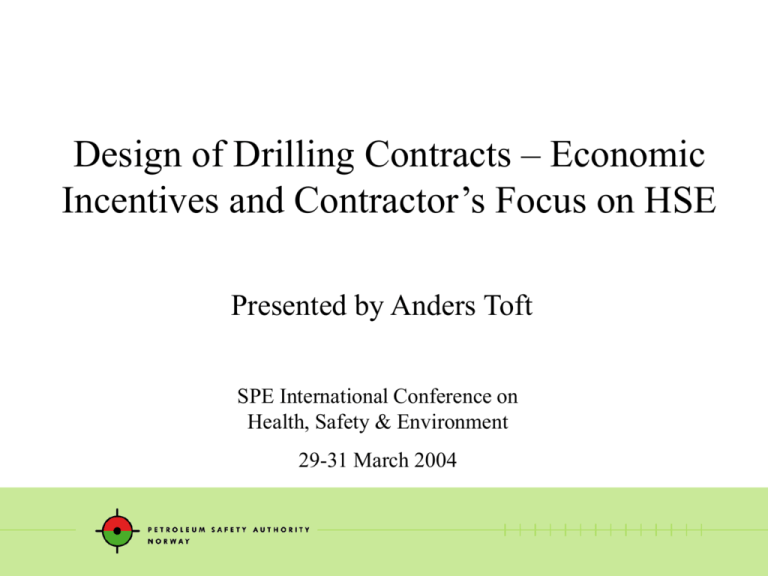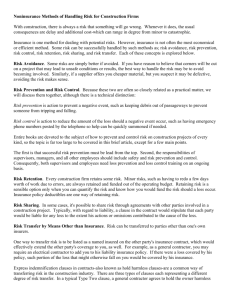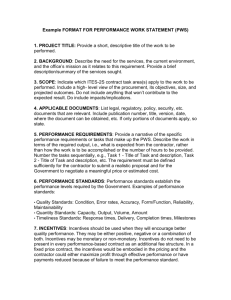Lysbilde 1
advertisement

Design of Drilling Contracts – Economic Incentives and Contractor’s Focus on HSE Presented by Anders Toft SPE International Conference on Health, Safety & Environment 29-31 March 2004 Work hours offshore, Norwegian continental shelf 35 000 000 30 000 000 25 000 000 20 000 000 15 000 000 10 000 000 5 000 000 0 1992 1994 1996 Contractor employees 1998 2000 Operator employees 2002 Economic incentives - definition Definition The contractor undertakes a complicated project for the operator. The effort is not observable for the operator To secure a satisfying result the operator makes the compensation dependent on the contractor’s performance Generally, the operator motivates the contractor by transferring economic risk The contractor is made economic responsible for his action High level of risk gives strong incentives The theory of multi-tasking Usually, the operator wants the contractor to focus on more than one aspect of the product Perform a drilling operation efficiently and to a low cost, but also appreciate the importance of HSE, drill a well with good production characteristics and a long production period Performance can be measured easily for some tasks, but be more difficult for others, for instance HSE When the operator cares about different activities of the contractor, but compensates only based on the observable subset of these activities, the contractor will exert greater effort on these activities while neglecting the unobservable ones It might be better, even, to provide no incentives at all than to provide them for one aspect of a job only Case: Design of drilling contracts Economic incentives in drilling contracts Compensation format Maintenance and repair clauses Incentives schemes Allocation of financial liability in the event of accidents Consequences associated with violation of safety regulations Bidding process Compensation format Day rates that include all costs The contractor covers costs associated with training, maintenance etc. Money saved will accrue to the supplier Compared to turnkey contracts (fixed price), day rates may give stronger focus on safety, but give significantly weaker cost incentives Day rates motivate cost reduction, but do not contain strong tempo incentives (as is the case with a fixed price contract) To keep the rig in operating mode as long as possible the day rates are differentiated Day rates - example Operating rate per day (OR) Stand-by rate per day OR*0,90 Moving rate per day OR*0,80 Suspension rate per day OR*0,50 Re-drilling rate per day OR*0,25 Lay-up rate per day OR*0,50 No payment rate No payment rate ”If the drilling unit is unable to perform the drilling work (exhibit xx) or the performance of the work is delayed due to repairs, maintenance and/or modifications to the drilling unit, slow progress or other noncompliance with the contract” Maintenance and repair clauses Differentiated day rates – incentive to keep the rig in operational mode and not stop the drilling operation for maintenance and repair Postpone/omit maintenance and repair Maintenance and repair are conducted while the rig is in operational mode Use of maintenance and repair clauses to curb this incentive Press Release E211:02 - 21 November 2002 ”The report identifies maintenance, drilling and deck operations as the highest risk activities…” Maintenance and repair clauses Example 1 20 hours of repair and maintenance at the paid operating rate. Accumulation from month to month, max. 120 hours over a period of six months. No transfer between six-month periods. Accumulated time can only be used for planned maintenance (at least 7 days planning perspective) Example 2 Repair rate, estimated at accumulated time during a calendar month (cannot be transferred to the next month). 0-8 hours, operating rate (+ USD 30,000). 8-16 hours, 80% of the operating rate. 16 hours and above, zero rate Incentive bonus of USD 30,000 per calendar month if the repair time is less than eight hours. Example 3 No maintenance and repair clause Incentives schemes Compensation in excess of fixed day rates Usually linked to progress Used to a varying extent and with varying force Ex post discussions related to criteria Uncertainty with regard to effect Damaging effects on safety focus Example 1 USD 10.000 per day (24 hours) or pro rata thereof for the time saved on the well subject to zero Loss Time Accident Example 2 USD 115,000 per day if less time spent than stipulated. Time spent: based on average for the three previous wells Allocation of financial liability in the event of accidents The greater the share of accident costs the contractor must bear, the greater is the incentive with regard to safety focus Financial liability related to Damage/injury/loss of personnel, property and indirect loss Damage to reservoirs and wells Third party claims, pollution, removal of rig/equipment from seabed Example: damage to wells Who is responsible for damage to wells – Criteria for contractor’s liability – Re-drilling rate Violation of the safety regulations – financial consequences Operator’s right to terminate the agreement because of violation of safety regulations/company specific safety requirements ”Contractor shall comply with Company's safety requirements at anytime. Failure to comply with the provisions of this Article shall be deemed to be a substantial breach of Contract” Dependent on the operator’s attitude (formalistic versus pragmatic) Economic consequences Bidding process The principles of bid evaluation constitute the most important incentive format for suppliers What the contractors experiences as the most important bid evaluation criteria and hence focus on – constitute an incentive format Emphasis on safety versus economic factors The effect of using e-auctions Contractor’s progress considerations Rapid progress Avoid reduced rate/zero rate Achieve bonus Obtain new assignments/options Avoid accidents Termination of agreement Delay Other costs, for example costs related to effects on reputation Market situation Rates and conditions in new assignments Contractor’s progress considerations Probability analysis Delay means economic loss the for rig owner with a high probability Faster progress means loss with low probability, and the relationship between action and effect may be complex Horizon (discount factor) Weigh certain loss now against possible loss later Considerations will be affected by companies’ liquidity What determines behaviour? Economic incentives Social norms Behaviour






